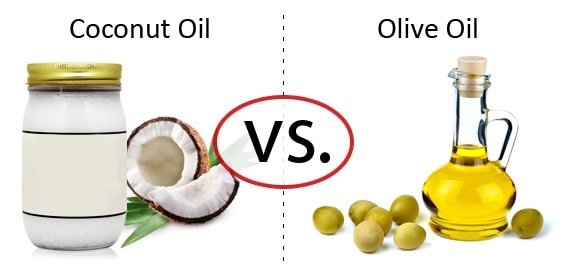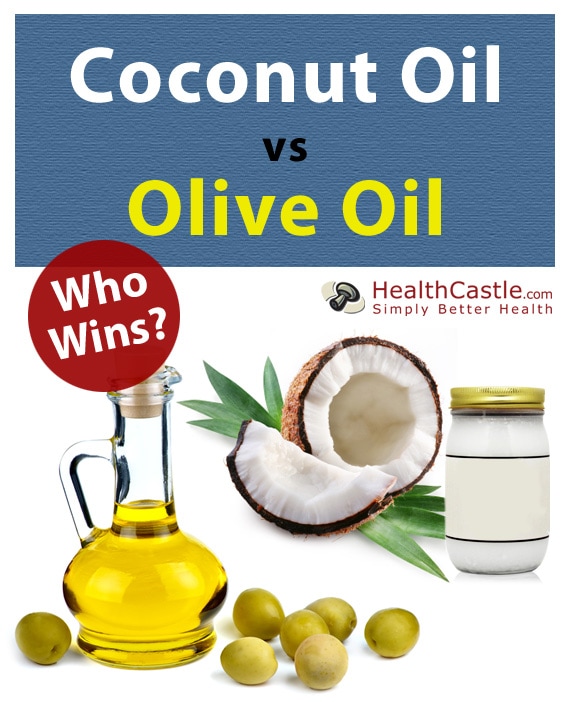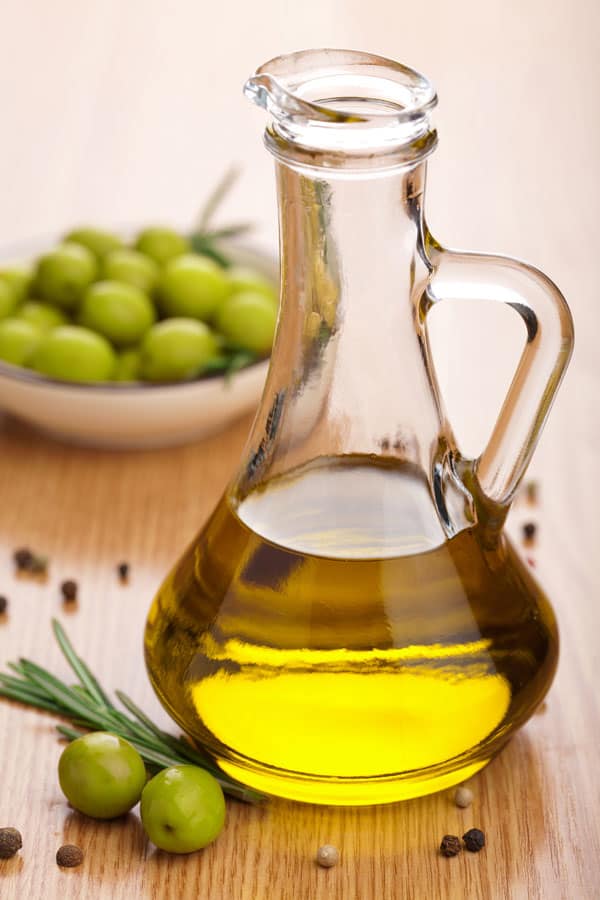
Written By: Sofia Layarda, MPH
Title: Master of Public Health
Alumni: University of California, Berkeley
Last Updated on:


In the world of cooking oils, olive oil has been well studied and has documented heart-healthy properties, such as a high level of monounsaturated fats and polyphenols with anti-inflammatory properties. The so-called Mediterranean diet, with its frequent use of olive oil, has been linked to a lower risk of heart disease. However, there is growing enthusiasm, especially among health enthusiasts, for the use of coconut oil – specifically, virgin coconut oil, which is obtained without the use of chemical solvents or heat treatment. Which oil is a better choice for everyday use at home?

Table of Contents
| Virgin Coconut Oil | Olive Oil | |
| Serving Size | 1 tbsp | 1 tbsp |
| Calories | 117 kcal | 119 kcal |
| Total Fat | 13.6 g | 13.5 g |
| Saturated Fat | 11.8 g | 1.9 g |
| Monounsaturated Fat | 0.8 g | 9.9 g |
| Polyunsaturated Fat | 0.2 g | 1.4 g |
These two oils have pretty much the same caloric and total fat amount. The difference lies in the proportion of saturated vs. unsaturated fatty acids. Coconut oil is made up mostly of saturated fatty acids, while olive oil is predominantly monounsaturated fatty acids.
Virgin coconut oil is different from the regular coconut oil you see listed on the ingredient label of processed foods. Virgin coconut oil contains polyphenols, which in other plant-based consumables such as red wine, chocolate, or tea have been associated with antioxidant and anti-inflammatory effects. On the other hand, the coconut oil used in packaged food is basically the saturated fat component of coconut oil and nothing else.

Early research into the possible benefits of virgin coconut oil have shown that it has antioxidant and anti-inflammatory properties. It has also been shown to raise the level of HDL cholesterol, which is the good cholesterol in the body. Coconut oil enthusiasts believe that lauric and myristic fatty acids – the main fatty acids in coconut oil – are more heart healthy than monounsaturated fats such as those found in olive oil. However, we need to put this in perspective: The point isn’t whether fatty acids from coconut oil are more heart healthy than fatty acids in olive oil. There are already hundreds of studies on olive oil and its health benefits from monounsaturated fats, while there are only 20 or so studies about virgin coconut oil. Virgin coconut oil may have some benefits, but do not expect it to perform miracles or cure all ailments.
Another important point: Both olive oil and coconut oil are calorically dense! If you’re concerned about heart conditions and weight, we recommend using less oil overall, regardless of whether the oil is touted as healthy. If you want to benefit from heart-healthy phytonutrients and antioxidants, boost your intake of fruits and vegetables, not oil. Whatever phytonutrient amount you get from oil pales in comparison to what you can get by eating fresh fruits and vegetables.
Alumni: University of California, Berkeley – Sofia believes in bringing back fun and pleasure into everyday eating. She loves cooking, and is constantly experimenting with ingredients, creating recipes and trying them out on family and friends. Her latest interest lies in finding realistic and practical ways of environmentally-friendly food/eating habits.
antioxidant, cholesterol, coconut oil, food faceoff, grocery aisle, heart smart, nutrition faceoff, olive oil, saturated fats, unsaturated fats
It’s not the HDL which has not been shown to be particularly important but the LDL especially the VLDL. Coconut oil, along with palm oil, and other highly saturated plant fats raise LDL and VLDL. Therefore there’s no comparison. Olive oil itself is not actually “hard healthy“ but healthier than other types of animal fats or other oils. Oils have a toxic affect on the endothelium whether they are saturated or unsaturated. Better to minimize oil in the diet altogether and get your fats from nuts and seeds and avocados